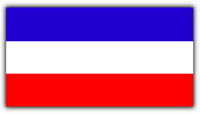Serbia's plans for Kosovo: autonomy with it's own police, but not army

Outlining Belgrade's offer for the territory that has been a U.N. protectorate since the 1998-99 conflict with ethnic Albanian separatists, a Serbian representative in international talks on Kosovo said the province "must remain part of Serbia ... with a high degree if autonomy," including the right to have own police, but not a military force.
Slobodan Samardzic described Belgrade's proposal as a compromise between independence demands by Kosovo's ethnic Albanian leadership and Serbia's resolve not to allow Kosovo to secede. The province is cherished by Serbs as the cradle of their state and culture.
Due to persisting ethnic tensions, the province needs to be "demilitarized," but should keep some troop presence of foreign peace troops, Samardzic said.
Kosovo has been run by a U.N. mission and NATO-led peacekeepers since 1999 when NATO bombed Serb targets to halt their crackdown on the separatists.
Western powers now seek a permanent solution for the province. Talks began earlier this year under the auspices of the U.N. and the six-nation Contact Groups - the United States, Britain, Germany, Russia, France and Italy.
Samardzic said that Serbia should not be involved in day-to-day affairs in Kosovo, which has a population that is about 90 percent ethnic Albanian. The province should keep its own government whose authority, however, would not include "foreign affairs, control of borders and customs," he said.
Kosovo's government would have "full financial autonomy, with the right to take loans from international financial institutions" and attract foreign investments, he added.
Kosovo's top ethnic Albanian official, Lutfi Haziri, called the offer "unacceptable and unreal."
"There's no other acceptable solution apart from independence with full sovereignty," said Haziri, a representative of the ethnic Albanian side in the talks.
Another Serbian negotiator, Leon Kojen, expressed concern for ancient Serb churches and monasteries in Kosovo, some of which have been destroyed by the mostly Muslim majority.
The key issue of security would be resolved by a "full demilitarization" of the province, with "no military troops, not Serbian not (ethnic) Albanian" in Kosovo, Samardzic said.
Some 10,000 people, mostly Kosovo Albanians, died in the Kosovo conflict.
The officials also proposed "free travel between Kosovo and the rest of Serbia, free flow of goods, service and investments."
Still, there should not be any Kosovo deputies in Serbia's parliament, nor Serbia's representatives in Kosovo bodies.
Subscribe to Pravda.Ru Telegram channel, Facebook, RSS!




